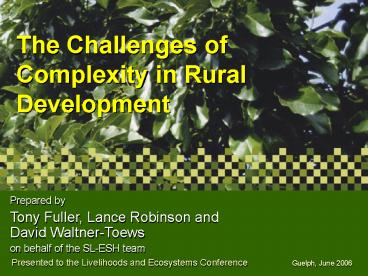The Challenges of Complexity in Rural Development - PowerPoint PPT Presentation
1 / 16
Title:
The Challenges of Complexity in Rural Development
Description:
Presented to the Livelihoods and Ecosystems Conference Guelph, June 2006 ... and assets, while not drawing down on environmental stocks or away from the ... – PowerPoint PPT presentation
Number of Views:65
Avg rating:3.0/5.0
Title: The Challenges of Complexity in Rural Development
1
The Challenges of Complexity in Rural Development
Prepared by Tony Fuller, Lance Robinson and
David Waltner-Toews on behalf of the SL-ESH team
Presented to the Livelihoods and Ecosystems
Conference Guelph, June 2006
2
CIDA Commitment toSL ESH in Agricultureand
Rural Development
- Policy recognizes the need for an integrated
systems-based approach that is founded on an
understanding of the nature of rural livelihoods
within complex, adapting systems - (preface The SL-ESH binder and CD, 2005-6)
CHALLENGES OF COMPLEXITY IN RURAL DEVELOPMENT,
2006
3
Review of the Experience
- Complete
- Literature
- Workshops (5) and policy discussions (8)
- To Come
- This conference
- Africa workshop
CHALLENGES OF COMPLEXITY IN RURAL DEVELOPMENT,
2006
4
Challenge Of Complexity
CHALLENGES OF COMPLEXITY IN RURAL DEVELOPMENT,
2006
5
More Complexity
CHALLENGES OF COMPLEXITY IN RURAL DEVELOPMENT,
2006
6
Ordered Complexity
CHALLENGES OF COMPLEXITY IN RURAL DEVELOPMENT,
2006
7
(No Transcript)
8
Complexity is Challenging
- Holistic big picture
- Connected and nested
- Unpredictable
- Emergent properties
- Multiple perspectives
- More than Complicated
CHALLENGES OF COMPLEXITY IN RURAL DEVELOPMENT,
2006
9
Two Approachesto help deal with Complexity
SL ESH
Two Entry Points
CHALLENGES OF COMPLEXITY IN RURAL DEVELOPMENT,
2006
10
What are Sustainable Livelihoods?
A livelihood comprises the assets (including both
material and social resources),capabilities,and
activities required for a means of living. A
livelihood is sustainable when it can cope with
and recover from stresses and shocks, and
maintain or enhance its capabilities and assets,
while not drawing down on environmental stocks or
away from the social or economic support of
others.
CHALLENGES OF COMPLEXITY IN RURAL DEVELOPMENT,
2006
11
The Sustainable Livelihoods Approach
- Think about livelihoods rather than jobs,
employment or income - People engage in a diversity of activities to
create their livelihoods - People draw upon a diversity of assets to create
their livelihoods - Resilience and recovery, and climbing out of
poverty, all relate to what happens to assets
(drawing down/trading up)
CHALLENGES OF COMPLEXITY IN RURAL DEVELOPMENT,
2006
12
What is Ecosystem Health?
- The ability and power of the human and non-human
stakeholders in an eco-social system to set and
accomplish goals for biophysical and
social-cultural well-being - For non-human stakeholders, the goals may be
mostly genetically programmed - For human stakeholders the genetic programming is
richly overlaid and modified through social
organization and action - Similar terms used for Social-Ecological systems
are vigour, self-organization, resilience
and integrity they all imply functional
attributes, rather than merely state descriptions.
CHALLENGES OF COMPLEXITY IN RURAL DEVELOPMENT,
2006
13
Assessing Ecosystem Health
- The assessment and promotion of ecosystem health
are linked and both are tied to the outcome we
wish to achieve. - Unlike a medical or environmental assessment, an
ecosystem health assessment requires a
combination of participatory work and a complex
systemic framework.
CHALLENGES OF COMPLEXITY IN RURAL DEVELOPMENT,
2006
14
Observations
- Holism is overwhelming, best when discovered
process - Approaches useful in agri rural development
(can be accomplished by seeing connections on one
page) - Natural and social perspectives can be
interrelated in the same framework - Broad directions rather than prescriptions (ie,
linkages rather than subject matter)
CHALLENGES OF COMPLEXITY IN RURAL DEVELOPMENT,
2006
15
Questions for the Conference
- Q? Are these approaches (SL-ESH) adequate,
limited or useful in dealing with Complexity? - Q? Should SL and ESH be joined together in some
way to increase understanding/utility/insights? - Q? Are such approaches likely to be helpful in
dealing with Contemporary Issues (climate change,
HIV AIDS, disasters, etc)
CHALLENGES OF COMPLEXITY IN RURAL DEVELOPMENT,
2006
16
CHALLENGES OF COMPLEXITY IN RURAL DEVELOPMENT,
2006






![⚡[PDF]✔ Representing Rural Women PowerPoint PPT Presentation](https://s3.amazonaws.com/images.powershow.com/10051172.th0.jpg?_=20240608112)
























